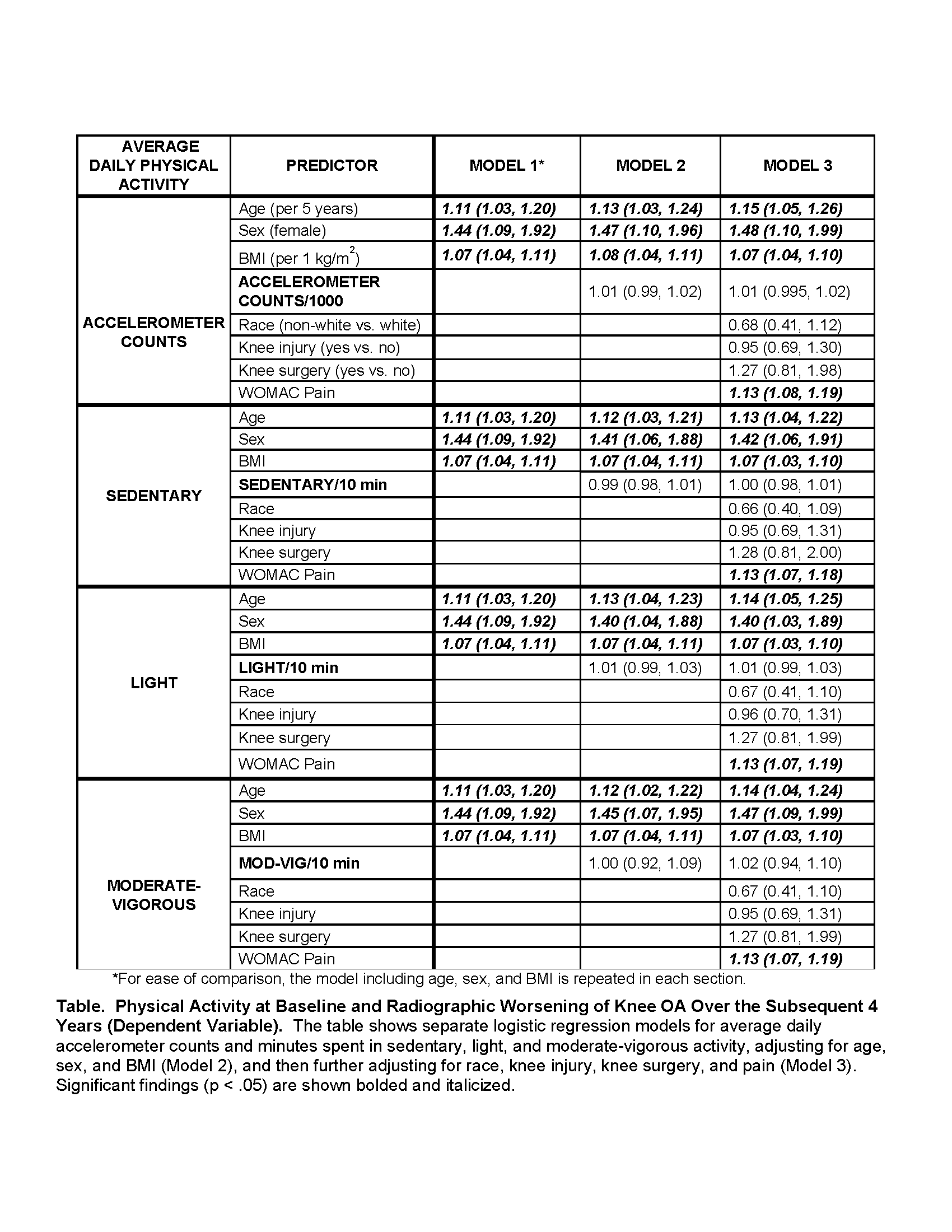Session Information
Date: Tuesday, November 7, 2017
Title: Osteoarthritis – Clinical Aspects Poster II: Observational and Epidemiological Studies
Session Type: ACR Poster Session C
Session Time: 9:00AM-11:00AM
Background/Purpose: The benefits of physical activity in the general population and among persons with knee osteoarthritis (OA) are well-established. However, it remains unclear if inactivity or heavy activity accelerate structural progression of knee OA disease. We tested the hypothesis that objectively measured physical activity is associated with greater risk of radiographic worsening of knee OA.
Methods: In Osteoarthritis Initiative (OAI) participants with or at higher risk for knee OA enrolled in an accelerometer substudy at 48m (analysis baseline), physical activity was measured by a uniaxial accelerometer (ActiGraph GT1M). Radiographic progression was defined primarily as any 48m-96m KL grade worsening. All analyses were knee-level; we used multivariable logistic regression with GEE, adjusting for key covariates.
Results: 1206 persons [mean age 64 yrs (SD 9), 631 (52%) women, BMI 28 (5), sedentary activity 602 minutes (86), light activity 284 minutes (75), moderate-vigorous activity 20 minutes (20)] contributed 1978 knees (at 48m, 57% KL0, 28% KL1, 10% KL2, 5% KL3) to the analysis sample, of which 267 (14%) had KL worsening. As shown in the Table, average daily accelerometer counts were not associated with worsening, nor was any type of physical activity examined in separate models. When sedentary, light, and moderate-vigorous activity were included in the same model, age, sex, BMI, and pain, but no type of activity, were associated with worsening: sedentary, adjusted OR 1.00, 95% CI 0.98, 1.02; light, adjusted OR 1.01, 95% CI 0.99, 1.04; moderate-vigorous, adjusted OR 1.01, 95% CI 0.93, 1.10. In analyses of the sample with full-limb alignment data, findings were similar and further adjustment for alignment had minimal impact. Inclusion of a quadratic term in these models did not reveal any evidence of a U-shaped relationship.
Conclusion: In persons with or at higher risk for knee OA, age, sex, BMI, and pain – but not average daily accelerometer counts or minutes of sedentary, light, or moderate-vigorous activity – were associated with subsequent worsening of KL grade. In this sample, most knees had no or only mild radiographic OA, and time spent in moderate-vigorous activity was relatively low. Whether findings differ in persons with more severe knee OA and/or engaged more frequently in moderate-vigorous activity should be examined in future studies.
To cite this abstract in AMA style:
Jayabalan P, Rouleau GW, Kocherginsky M, Dunlop DD, Lee J, Chang RW, Sharma L. Physical Activity and Disease Progression in Persons with or at Higher Risk for Knee Osteoarthritis [abstract]. Arthritis Rheumatol. 2017; 69 (suppl 10). https://acrabstracts.org/abstract/physical-activity-and-disease-progression-in-persons-with-or-at-higher-risk-for-knee-osteoarthritis/. Accessed .« Back to 2017 ACR/ARHP Annual Meeting
ACR Meeting Abstracts - https://acrabstracts.org/abstract/physical-activity-and-disease-progression-in-persons-with-or-at-higher-risk-for-knee-osteoarthritis/

